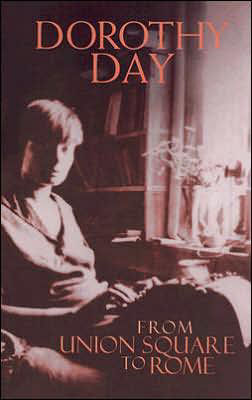
|
Posted January 5, 2007
Book: Dorothy Day: From Union Square to Rome Orbis Books. Maryknoll, NY. 2006. Pp. 177 An Excerpt from the Jacket:
In this concise and passionate work, Day’s purpose was to give an account to her comrades in the radical movement of how she came to embrace Christ and the Catholic Church. An Excerpt from the Book: You ask me how I came to reject Communism. First of all, let this be understood, that I was a Communist in sympathy but with reservations scarcely formulated. I accepted Marxism as an economic theory and if I had been pinned down as to whether or not I was an atheist, I would probably have argued as you do: “How can we believe in a God who permitted such suffering and injustice in the world?” Always at the bottom of my heart was the desire to believe, sometimes so faint as to be barely perceptible, at other times very strong. But I distrusted myself, my own emotional reactions and my own instability. I did not believe in private property. I wanted to work for a state of society in which each should “work according to his ability and receive according to his need.” That is Marx’s definition of Communism. I did not believe that greedy and unjust men could be converted. I believed rather in the inevitability of revolution. The three fundamentals of Communist belief are: 1. there is no other world than this; our last end is death and the grave, not God. 2. The ideal state is a Communist state in which there is no individual ownership but communal ownership. 3. Since there is no other way of achieving this except by violent means, then we must use those violent means. It is a cause worth dying for. Of course this analysis is oversimplified, but it will serve to show how easy it is for idealistic young people, brought up without religion, to accept Communism. Paul Claudel says that youth demands the heroic. Someone else wrote once that he who is not a Socialist at the age of twenty has no heart, and he who is a Socialist at the age of thirty has no head. I grieved at what I thought to be th necessity of subscribing to that first belief that our lives ended at the grave, but I thought it braver to accept it. I wholeheartedly subscribed to the other two fundamentals of Communism. Now the creed to which I subscribe is like a battle cry, engraved on my heart — the Credo of the Holy Roman Catholic Church. Before, in those former times, I could say: “I shall sleep in the dust: and if thou seek me in the morning, I shall not be” (Job 7:21). Now I can say: “I know that my Redeemer liveth and in the last day I shall rise out of the earth. And I shall be clothed again with my skin, and in my flesh I shall see God. Whom I myself shall see and my eyes shall behold, and not another: this my hope is laid up in my bosom” (Job 19:25-27). I had a conversion with John Spivak, the Communist writer, a few years ago and he said to me, “How can you believe? How can you believe in the Immaculate Conception, in the Virgin birth, in the Resurrection?” I could only say that I believe in the Roman Catholic Church and all She teaches. I have accepted Her authority with my whole heart. At the same time I want to point out to you that we are taught to pray for final perseverance. We are taught that faith is a gift and sometimes I wonder why some have it and some do not. I feel my own unworthiness and can never be grateful enough to God for His gift of faith. St. Paul tells us that if we do not correspond to the graces we receive, they will be withdrawn. So I believe also that we should walk in fear, “work out our salvation in fear and trembling.” Table of Contents: 1. Why 2. Childhood 3. Early years 4. College 5. Rayna Prohme 6. New York 7. Reporting 8. The rigorous life 9. Chicago 10. Peace 11. New life 12. Wheat and cockle 13. Your three objections |
|
